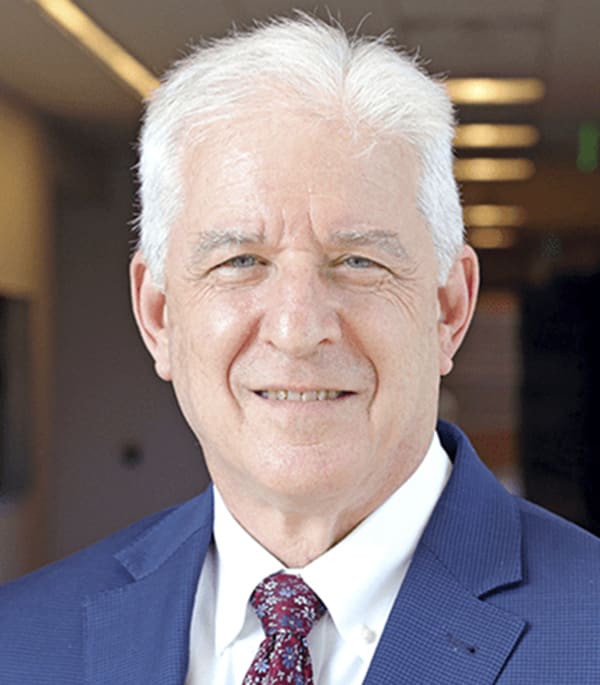Nicholas H. Fiebach, MD, Senior Associate Dean for the Columbia University Stamford Hospital Affiliation, Chair, Department of Medicine
As a prospective patient of Stamford Hospital, you may be wondering what receiving care from a teaching hospital may mean for you.
New advances in healthcare happen every day. Innovative discoveries, techniques, medications, and treatments make it possible for people to recover more quickly and return to work and family much faster. How do physicians keep up with all that is new in the world of patient care? Continuing Medical Education (CME) must become part of any healthcare professional’s career.
The following breakdown may be helpful to you.
Many doctors consider teaching the new generation of doctors as one of the most important ways that they, themselves, stay current in medicine and innovations in the field. So, “teaching hospitals” are sought out by doctors who want to practice medicine in an environment that is committed to best-in-class care, learning and innovation.
As a prospective patient of Stamford Hospital, you may be wondering what receiving care from a teaching hospital may mean for you.
New advances in healthcare happen every day. Innovative discoveries, techniques, medications, and treatments make it possible for people to recover more quickly and return to work and family much faster. How do physicians keep up with all that is new in the world of patient care? Continuing Medical Education (CME) must become part of any healthcare professional’s career.
The following breakdown may be helpful to you.
What is a teaching hospital?
A teaching hospital is a hospital that’s affiliated with a medical school and teaches medical students, resident physicians and perhaps other learners. There is often a research program associated with a Teaching Hospital.Many doctors consider teaching the new generation of doctors as one of the most important ways that they, themselves, stay current in medicine and innovations in the field. So, “teaching hospitals” are sought out by doctors who want to practice medicine in an environment that is committed to best-in-class care, learning and innovation.
Is Stamford Hospital a teaching hospital?
Yes, Stamford Hospital is a teaching hospital, meaning that there is a structure to support and a culture of medical education for current and future doctors.- After completing medical school, a new doctor enrolls into a residency program. Years ago, these young doctors would “reside” at a hospital for this stage of their education and training.
- At Stamford Hospital, there are residency programs in Internal Medicine, Surgery, Obstetrics & Gynecology and Family Medicine. These programs are all affiliated with the Columbia University Vagelos College of Physicians & Surgeons.
- These young doctors are directly supervised by senior Stamford Hospital physicians who also have teaching appointments at Columbia. These senior physicians have dedicated their career to life-long learning and education.
- Stamford Hospital is the second largest teaching site, next to New York-Presbyterian Hospital, for future doctors from the Vagelos College of Physicians & Surgeons at Columbia University. Medical students from Columbia come to Stamford to learn Internal Medicine, Surgery, Obstetrics and Gynecology and Primary Care.
- Other learners, such as Physician Assistant, Nursing and Physical Therapy students from a select group of schools, also partner with Stamford Hospital as a site for students’ education.
Is a resident a doctor?
Yes. A resident is a doctor who has completed medical school, has earned a degree such as M.D. or D.O. or M.B.B.S. and practices under the direct supervision of an “attending” or senior physician. Doctors complete residencies so that they can specialize and become Board Certified in a particular field such as surgery or internal medicine. Stamford requires that all our physicians be Board Certified or Board Eligible to practice here.Why should I choose a teaching hospital over a community hospital for my care?
I am certainly biased in this regard because I believe that teaching hospitals offer the best for a patient when you are ill and perhaps hospitalized. The residents and the medical students are in the hospital so they can be at your side if you need anything. They work with your attending or senior physician and help to coordinate the care and carry out the plans. Patients get the added benefit of having several doctors involved in their care so all the possibilities can be considered. For example, a recent study published in the Annals of Surgery showed that patients undergoing high-risk surgery had better outcomes at teaching hospitals, with lower costs.What can a teaching hospital offer me as a patient?
As a patient at a teaching hospital, you will have the opportunity to have a variety of different levels of physicians caring for you, and thinking about your treatment. Many teaching hospitals have research programs so that newer techniques, medications and other treatments can be available to you there. Many patients are gratified to be able to contribute to the training of the next generation of physicians.As a patient at a teaching hospital, can I refuse to have students and residents involved in my care?
Yes, you have the right to decide whether or not you want to have students or residents in the room when you are being treated or involved in your care. We respect your wishes and you should know that your treatment and care will not be affected by your choice. Communicate your wishes to your attending physician or the nursing staff.What does being a patient at a teaching hospital mean to the students and residents?
The students and the resident physicians are very grateful to patients. I always ask patients when I am with students to share any advice they have to these young doctors in training. The patients’ responses are so important. My philosophy is to never lose interest in the patient as a whole person, similar to the Planetree Philosophy of Person-Centered Care.Featured Expert/ Author






